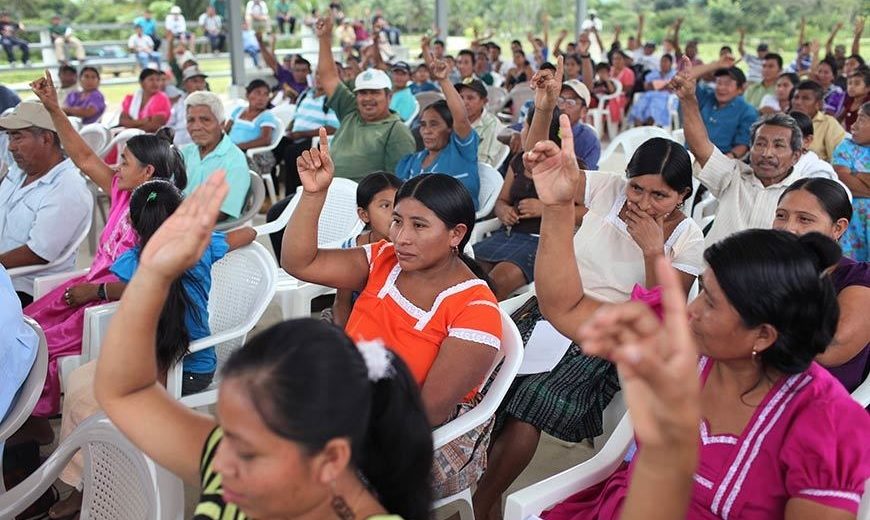5 Jul 2019
Decent work and a decent income. It’s not much to ask, is it?
More than 1,400 small-scale Fairtrade certified cooperatives in 73 countries are celebrating this year’s International Day of Cooperatives around the theme of ‘decent work’. Here's why.
By Gelkha Buitrago, Director of Standards & Pricing, Fairtrade International

Image © James A. Rodríguez
There’s a saying in English: “the whole is greater than the sum of the parts.” Put simply, it means that if people collaborate, they can often achieve more than if each person worked on their own.
That’s the essence of a cooperative. By working together, pooling resources, experience, skills and a common vision, and sharing profits more fairly, Fairtrade coops are stronger and better able to stand up for themselves in an often hostile trading environment. Based on shared values of self-help, self-responsibility, democracy, equality, equity, and solidarity, coops are changing the way global trade works.
More than 1,400 small-scale Fairtrade farming organizations in 73 countries are celebrating this year’s International Day of Cooperatives on July 6th around the theme of ‘decent work’. The size of Fairtrade coops varies enormously - the smallest has just two members, while the largest has more than 90,000, with the average at around 260. Globally, that adds up to nearly 1.5 million farmers enjoying the benefits of belonging to a Fairtrade coop - including the safety net of the Fairtrade Minimum Price and extra money from the Fairtrade Premium (the extra money they get for selling on Fairtrade terms) to invest as they see fit.
The eighth UN Sustainable Development Goal (SDG) aims for decent work and economic growth. Fairtrade’s philosophy is that a decent income is an essential pillar of decent work - they are two sides of the same coin. A decent income is a basic human right, but millions of farmers and workers in the developing world don’t even earn enough to pay for the basics like nutritious food, housing and education, let alone save for unexpected setbacks or for a dignified retirement. The price paid to growers of products such as coffee, tea, cocoa and bananas is simply too low, which in turn means they themselves cannot afford to pay their workers a decent wage.
That’s why coops are so important. Fairtrade coops give their members the power to negotiate better deals with traders; to access credit, insurance and other financial services; to decide for themselves how to spend the Fairtrade Premium; and for women, joining a Fairtrade coop can be the first step to gender equity and self-determination.
Take the women of the 470-strong Koperasi Kopi Wanita Gayo coffee coop in Aceh, Indonesia. It’s the first all-women coffee cooperative in south east Asia, set up to give women a say in this deeply conservative and male-dominated community. In their first year of trading they produced 13 tonnes of coffee and plan to use the Fairtrade Premium to build a reproductive health centre, as well as donating an ambulance for the local community to use.
In Malawi, the Sukambizi Association, a Fairtrade tea coop with more than 8,000 members, invested some of its Fairtrade Premium in essential services for children, including 12 school blocks in different villages. Before these schools were built, many parents were reluctant to send their children on long walks to distant schools, leading to high absenteeism. They’ve also built a maternity hospital, bought an ambulance and provided clean water to more than 4,000 families.
Meanwhile in Côte d’Ivoire, Awa Bamba, Director General of the 3,000+ membership Cayat cocoa coop, was one of the first graduates from the Fairtrade Women’s School of Leadership. Under Bamba’s direction, Cayat has nearly doubled its production and has diversified into other revenue streams such as poultry and egg production. Their Fairtrade Premium has also been used to fund a community radio station, invest in nursery schools and set up a micro-loan scheme for members.
These examples - just three of many thousands Fairtrade coops around the world - show how the Fairtrade coop model helps their members to achieve decent work. But the reality is that many smallholder farmers remain trapped in poverty, so earlier this year Fairtrade revised its standard for small-scale farmers to strengthen their power in trade relationships. The revisions - which are explained in this new video - will enable Fairtrade coop members to enjoy greater benefits, including helping them become more resilient to market shocks and climate change. So join us, and the thousands of Fairtrade coops around the world, as we celebrate the International Day of Cooperatives and the campaign for decent work and a decent income.